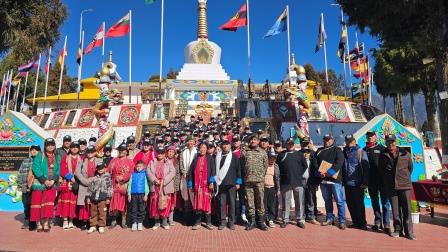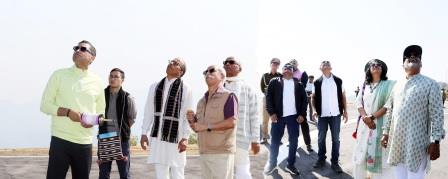-
Governor urges students to dream big, nurture positive…
-
Tourist from Kerala die in icy Sela lake, another…
-
Arunachal Pineapple Festival Bagra 3.0 kicks off
-
Indian Army organises ESM meet to commemorate Armed Forces…
-
 Veterans' Day celebrated with reverence and pride in Tawang
Veterans' Day celebrated with reverence and pride in Tawang
-
 Governor participates in kite-flying festival
Governor participates in kite-flying festival
-
Arunachal Pradesh set to receive 152 NCC Cadet Volunteers as…
-
Mein inaugurates hostel building at Pali Vidyapeeth, Announces support
-
State-Level Workshop on Career Guide Book and “My Career Advisor”…
-
Farmers trained on agro-techniques focusing on large cardamom
By Nalong Mize
The Rashtriya Swayamsevak Sangh (RSS) has recently completed 100 years of its existence. Starting as a small group of dedicated individuals, it has today grown into the largest socio-cultural organisation in the world. With a focused purpose of man-making and nation-building as its core mission, the work and impact of the RSS can be felt in almost every sphere of national life today.
In Arunachal Pradesh, the RSS formally began its activities in 1990. Over the past three decades, the organisation has expanded its network across all districts of the state. On the occasion of its centenary year, it is worthwhile to reflect upon the work of the RSS in Arunachal Pradesh and its impact on the socio-cultural landscape from a local perspective.
As a local person from Arunachal Pradesh, I feel that the presence of the RSS in our state has been a godsend, particularly in terms of preserving our indigenous culture and empowering society. The RSS firmly believes that a society must be organised to be strong. Accordingly, it has played a key role in helping local communities organise themselves, realise their inner strength, and harness their potential — especially in the preservation and continuation of our indigenous faiths and cultures.
With the advent of modernity and rapid development, challenges such as cultural erosion and decline of traditional faiths emerged swiftly in Arunachal Pradesh. Before the mid-19th century, the people of this region primarily followed Indian-origin faiths. However, as contact with the outside world increased, external influences began to affect local beliefs and practices. The main reason behind this was the lack of organisation and unity among followers of local faiths such as Donyi-Polo, Rang Fra, and Ami Matai. Consequently, it became easier for external forces to sway the gullible and unorganised sections of society, leading to a steady erosion of indigenous beliefs and customs.
In this context, the RSS played a pivotal role in helping followers of local faiths — particularly the Donyi-Polo faith — to organise themselves and work towards the preservation, promotion, and propagation of indigenous traditions. The RSS inspired and guided indigenous faith leaders such as Late Talom Rukbo, who founded the Donyi-Polo Yelam Kebang among the Adi community. Today, thanks to the efforts of the Donyi-Polo Yelam Kebang, followers of the faith are well-organised and continue to work actively for its furtherance. This has, in turn, ensured the continuation of our vibrant cultures and customs, which form the rich legacy and heritage of Arunachal Pradesh.
A great cultural consciousness has now awakened among a large section of society about the importance of preserving and promoting indigenous traditions. This awakening has led to the formation of umbrella organisations such as the Indigenous Faith and Cultural Society of Arunachal Pradesh (IFCSAP), which represents common interests and acts as the voice of indigenous faiths in the state. As a result, there is now a stronger appreciation and pride among the local people for their own faiths, culture, and customs — leading to their preservation and continuity.
Today, Arunachal Pradesh stands out in the world for two remarkable attributes — its natural beauty and its cultural richness. To a great extent, this is due to the dedicated work and guidance of the RSS and its committed karyakartas.
Another area where the impact of the RSS has been deeply felt is education. In the early days of modern education in Arunachal Pradesh, schooling was primarily provided by the government. However, there was a noticeable gap in imparting value-based, quality education with residential facilities. To fill this gap, institutions like the Ramakrishna Mission Schools were established in the 1960s. Inspired by their success, Vivekananda Kendra Vidyalayas (VKVs) were started across the state by Vivekananda Kendra. The founder of Vivekananda Kendra, Shri Eknath Ji Ranade, was himself an RSS pracharak who dedicated his life to spreading quality education rooted in Indian ethos and values.
Over the years, VKVs have produced many distinguished students who have gone on to serve Arunachal Pradesh in various capacities — as political leaders, administrators, doctors, engineers, journalists, and more. These institutions have made an immense contribution to the state by producing capable and value-driven human resources, leading to social empowerment and overall growth.
It is also worth clarifying that VKVs are not faith-based schools. They do not preach any particular religion. In the prayer halls of VKV schools, students of all faiths join together to pay respect to great teachers and spiritual figures like Swami Vivekananda and Sri Ramakrishna Paramhansa.
Interestingly, very few people in Arunachal Pradesh know that VKV schools were founded by a pracharak of the RSS. This is because the RSS believes in working silently rather than seeking publicity. Its strength lies in quiet, dedicated service to society.
Disclaimer : The writer is Chairman, Arunachal Pradesh Forest Corporation Limited. The views expressed in this article are personal and do not represent the editorial or organisational views.

Kenter Joya Riba
(Managing Editor)She is a graduate in Science with post graduation in Sociology from University of Pune. She has been in the media industry for nearly a decade. Before turning to print business, she has been associated with radio and television.
Email: kenterjoyaz@easternsentinel.in / editoreasternsentinel@gmail.com
Phone: 0360-2212313

